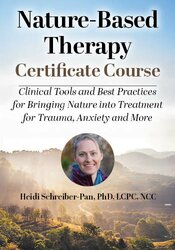
Sujets d'actualité :
×

We train therapists to track thoughts, breath, and trauma loops …
But most were never taught to work with the body’s oldest regulator: nature.
And that gap shows up in the room.
Your clients are burned out. Shut down.
Stuck on screens or struck in survival mode.
And the usual techniques aren’t always getting through.
This one-day clinical training offers something different.
Not a walk in the woods.
Not a wellness trend.
But a set of evidence-based, nature-informed interventions that regulate the nervous system – fast.
You’ll learn how to engage the healing power of nature using sensory anchoring, metaphor, awe, and attention training – tools that work in city offices, telehealth sessions, and traditional outdoor settings alike.
Led by Heidi Schreiber-Pan, PhD, executive director of the Center for Nature-Informed Therapy, this is the official training from the Nature-Informed Therapy Institute.
In just one day, you’ll earn your Foundational Certificate in Nature-Based Therapy – and walk away with practical tools you can use right away:
You don’t have to change your whole approach.
You just need the right tools – designed to work with how humans actually heal.
These are practical, neuroscience-backed strategies you can use with any client, in any setting – no forest required.
Earn your certificate. Build your skills. Expand your impact.
Reserve your spot now
Tous les membres du comité de planification de PESI, Inc. ont divulgué leurs relations financières avec des organisations non éligibles et toutes les relations non financières pertinentes avant de planifier le contenu de cette activité. Aucun des membres du comité n'avait de relations financières pertinentes avec des entreprises non éligibles ou d'autres relations potentiellement biaisées à divulguer aux apprenants. Pour les divulgations sur Conférenciers , veuillez consulter la biographie de la faculté.
Des informations sur les crédits de formation continue seront bientôt disponibles pour ce kit d'auto-apprentissage non interactif.
Des crédits de formation continue peuvent être disponibles pour certaines professions, comme indiqué dans le public cible. Les heures dépendront de la durée réelle de l'enregistrement. Veuillez vérifier les exigences spécifiques auprès de l'organisme d'agrément de votre État ou de votre organisation.
Des frais supplémentaires peuvent être facturés pour les certificats de formation continue. Veuillez contacter notre service clientèle au 1-800-844-8260 pour plus de détails.
**Le matériel inclus dans ce cours peut inclure des interventions et des modalités qui vont au-delà de la pratique autorisée de votre profession. En tant que professionnel agréé, vous êtes responsable de l'examen du champ d'application de la pratique, y compris des activités qui sont définies dans la loi comme dépassant les limites de la pratique, conformément aux normes de votre profession et dans le respect de celles-ci.

Heidi Schreiber-Pan, PhD, LCPC, is a successful psychotherapist, author, clinical director and sought-after nationwide speaker on topics of resilience, anxiety, neuroscience, and occupational burnout. As an affiliate and former faculty member of Loyola University, Maryland, her past research has focused on resiliency and psychological well-being, including nature-based mental health.
Dr. Schreiber-Pan has worked with various organizations, schools and corporations to reduce stress on a communal level and to increase structural well-being through training in positive psychology as well as emotional intelligence coaching.
She has developed unique continuing education courses that combine established clinical methods such as CBT with innovative treatment approached including nature-based psychotherapy and neuro-counseling. She is the author of Taming the Anxious Mind: A Guidebook to Relieve Stress and Anxiety.
Conférenciers Divulgations :
Consultez notre page FAQ à l'adresse https://www.pesicanada.ca/faq ou contactez-nous à l'adresse https://www.pesicanada.ca/contact-us.
L'accès à ce produit n'expire jamais.
Foundations: The Neurobiology of Stress and the Healing Power of Nature
Clinical Interventions: Apply Nature-Based Strategies Across Diagnoses
Expand the Frame: Culture, Identity, and Ethical Practice in Nature-Based Work
Integration: Clinical Cases and Group Dialogue
Garantie de satisfaction
Votre satisfaction est notre objectif et notre garantie. Les questions doivent être adressées à info@pesicanada.com.
Veuillez patienter ...